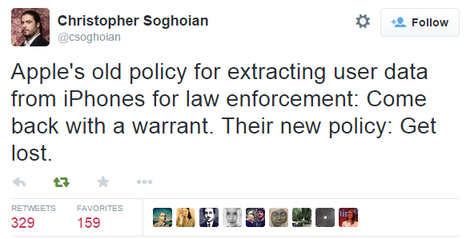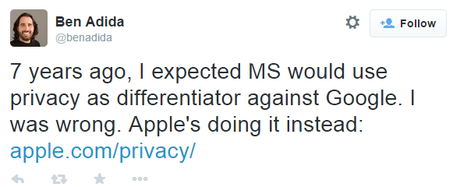Google decided to wait with Android data encryption by default
Google, which promised default encryption ( full-disk encryption ) on devices running its new mobile operating system, Android Lollipop, apparently went backwards. The Ars Technica publication reports that new smartphones running Android L do not include this option enabled by default. Technical requirements of the device (hardware requirements) for this OS were published only in January of this year and it became clear from them that they are not talking about data encryption by default.

Conversations about encrypting data on devices began after a series of materials published in the media by a runaway NSA specialist Edward Snowden, from which it became clear that intelligence services can access user information stored on the device. Such an operation can be carried out with the use of various software and online services, while the encryption of data on the device by default would make it difficult for the special services to obtain personal and other information on the device.
')
In 2014, Google’s statement about encrypting data on a device by default was published in a number of leading media outlets, including The Washington Post.
Default encryption still appeared, but only on two models of devices that are released by Google itself - Nexus 6 & Nexus 9. Other Nexus devices that received the ability to upgrade to Lollipop no longer contain this option enabled by default, even in the case of a full reset the device itself ( full reset ). The same applies to smartphones from other manufacturers, which began to appear after the mentioned Nexus models, i.e., encryption on them is turned off.
The mentioned Lollipop technical documentation contains the following information.
It’s obvious that Google provides OEMs with their own suppliers to decide whether to make such an option enabled by default for the device or not. The same was stated for the previous version of Android called KitKat, in fact, in this respect, nothing has changed.
Recall that in September last year, Apple with the release of iOS 8, has introduced an additional protection function "from the NSA", which encrypts the user's personal data using the device unlock password ( passcode ).

Apple


Conversations about encrypting data on devices began after a series of materials published in the media by a runaway NSA specialist Edward Snowden, from which it became clear that intelligence services can access user information stored on the device. Such an operation can be carried out with the use of various software and online services, while the encryption of data on the device by default would make it difficult for the special services to obtain personal and other information on the device.
')
In 2014, Google’s statement about encrypting data on a device by default was published in a number of leading media outlets, including The Washington Post.
It can not be shared with law enforcement. If you’re on the phone, you’ll not be able to get it.
Default encryption still appeared, but only on two models of devices that are released by Google itself - Nexus 6 & Nexus 9. Other Nexus devices that received the ability to upgrade to Lollipop no longer contain this option enabled by default, even in the case of a full reset the device itself ( full reset ). The same applies to smartphones from other manufacturers, which began to appear after the mentioned Nexus models, i.e., encryption on them is turned off.
The mentioned Lollipop technical documentation contains the following information.
9.9 Full-Disk Encryption
If you need to use your data card, you will need to make sure that you can use the SD card. For all devices supporting the full-disk encryption, it has been completed. It is very strongly that this version of the Android platform is very strongly recommended.
It’s obvious that Google provides OEMs with their own suppliers to decide whether to make such an option enabled by default for the device or not. The same was stated for the previous version of Android called KitKat, in fact, in this respect, nothing has changed.
Recall that in September last year, Apple with the release of iOS 8, has introduced an additional protection function "from the NSA", which encrypts the user's personal data using the device unlock password ( passcode ).

On devices running iOS 8, your email data contacts, including messages, emails, contacts, call history, iTunes, passwords.
Apple

Source: https://habr.com/ru/post/252027/
All Articles